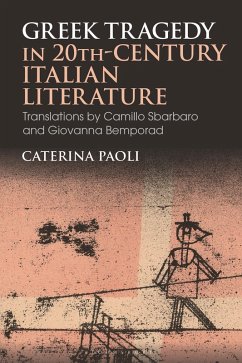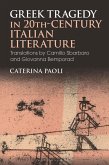Focusing on the works of Camillo Sbarbaro and Giovanna Bemporad, this book offers the first in-depth analysis of poetic translations of Greek tragedy in 20th-century Italian poetry. The close examination of the linguistic and ideological diversity embedded in these authors' works shows how narratives of Greek tragedy shaped their poetic universe, and how their work influenced the Greek paradigm in return. The reader is presented with a textual analysis of Sbarbaro's and Bemporad's translations, as well as a discussion of larger cultural patterns.
This volume provides a fresh perspective on the pedagogical commitment of the Italian poets and their roles as translators of classical studies. The web of relationships and historical context in which these authors are placed provide an understanding of their importance for a wider discourse on translation in Italy and Europe in the 1940s. Caterina Paoli's original analysis of Sbarbaro's and Bemporad's poetic translations and her emphasis on their relevance for translation studies, women's writing and classical reception, fills a significant gap in current scholarship on the translation of ancient literature in the Italian poetic community.
This volume provides a fresh perspective on the pedagogical commitment of the Italian poets and their roles as translators of classical studies. The web of relationships and historical context in which these authors are placed provide an understanding of their importance for a wider discourse on translation in Italy and Europe in the 1940s. Caterina Paoli's original analysis of Sbarbaro's and Bemporad's poetic translations and her emphasis on their relevance for translation studies, women's writing and classical reception, fills a significant gap in current scholarship on the translation of ancient literature in the Italian poetic community.









